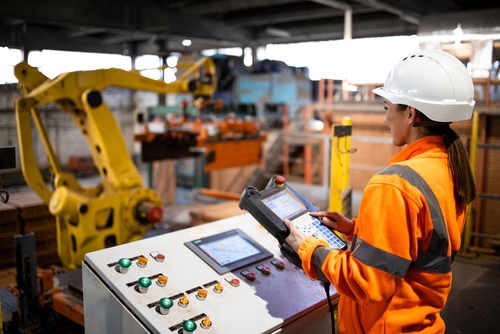
Training and recruiting skilled workers in the manufacturing field are top concerns in Pennsylvania’s Lehigh Valley, as in other parts of the state, according to testimony given during a hearing led by State House Republicans on Friday.
“If I could flip a switch and have access to a pool of qualified machinists, I could justify hiring 20 of them overnight,” testified Michael Druckenmiller, vice president of Lehigh Heavy Forge Corp. “But there just are not enough of them out in the market today to do so.”
The hearing, titled “Manufacturing Momentum: Assembling PA’s Workforce,” took place at Bethlehem, Pa.-based Lehigh Heavy Forge, the last remaining super-heavy forging plant in North America.
State Rep. Ann Flood (R-Northampton) and the House Republican Policy Committee, led by Chairman Josh Kail (R-Beaver/Washington), convened the hearing to discuss the workforce challenges Pennsylvania manufacturers face and how to fill the abundance of family-sustaining jobs in the Lehigh Valley with skilled workers.
“Manufacturing plays a vital role in the Lehigh Valley, contributing up to 16 percent of our region’s GDP,” Flood said. “There is no better time than now for Pennsylvania policymakers to find solutions to keep this industry thriving and to secure the Lehigh Valley as a destination for family-sustaining jobs in manufacturing.”
Kail pointed out that manufacturers have helped build America, and Pennsylvania’s rich history is due in great part to the manufacturing industry.
“We cannot miss this opportunity to reinvigorate an industrial force that could help Pennsylvania to not just compete, but to dominate,” said Kail. “We must maintain manufacturing momentum — Pennsylvania’s economy depends on it, our nation’s security depends on it.”
Joining Druckenmiller to provide testimony to the committee Republicans were Blair Woodring, director of business development at Precision Custom Components; Nancy Dischinat, executive director for Workforce Board Lehigh Valley; and John Rhatigan, chairman of the Marine Machinery Association.
Dischinat said the Workforce Board Lehigh Valley is designated by the governor as a regional Workforce Development System for the Lehigh Valley, providing adults, dislocated workers, youth, and others with access to education, skills training, on-the-job training, work experiences, pre-apprenticeships, apprenticeships, and any kind of training that employers need based on high-priority occupations, workforce data, and current and projected demand.
“The workforce landscape in the Lehigh Valley has evolved, particularly within our crucial manufacturing sector,” testified Dischinat. “We’ve heard directly from manufacturing employers who emphasize the importance of skilled labor to maintain productivity and growth. Companies are facing significant gaps in essential skills, particularly in advanced manufacturing technologies.”
According to a survey that her organization did with the Greater Lehigh Valley Chamber of Commerce, manufacturers are facing significant gaps in both hard and soft skills among applicants.
“Finding people to fill open positions is becoming increasingly difficult and fewer applicants have the hard skills these businesses need to succeed,” she said, noting that Lehigh Valley businesses compete against each other for an increasingly small pool of skilled manufacturing workers.
“While we can all appreciate that competition is a positive market force, our companies are suffering because we are not growing a technically skilled workforce fast enough and we do not have a career and technical education [CTE] system that is mainstreamed, nor is it forefront in education,” added Dischinat.
Among her recommendations, Dischinat told lawmakers that a workforce pipeline should be grown through technical training and that CTE opportunities should be fully funded and directly embedded in high schools.
Dischinat also suggested that a Regional Employer-Driven Industry and Workforce Committee be mandated to ensure current and next steps skills training for targeted industry sectors like manufacturing.